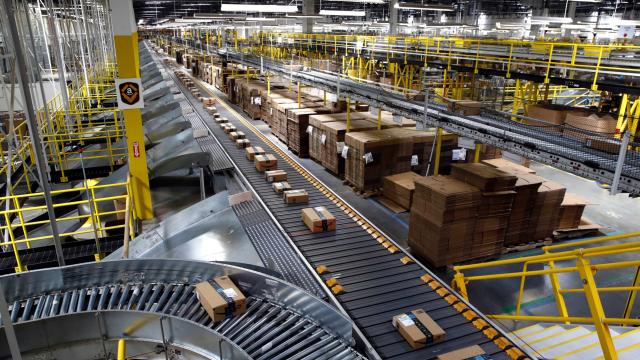The Federal Trade Commission is putting Amazon under “closer watch,” a move that may signify heightened interest in some kind of antitrust investigation against the online retail behemoth, the Washington Post reported on Friday.
Three sources “familiar with the matter” told the Post that more muscular FTC oversight of Amazon is the result of an arrangement with the Department of Justice—which was recently reported to be weighing a similar look at search giant Google. (Both the DOJ and the FTC are competition watchdogs, and said arrangement reportedly involves the two agencies agreeing which would take point on specific companies.)
According to the Post, what exactly the FTC and DOJ plan to do with regards to either company does not yet appear to have been determined, and may not be for some time:
The FTC’s plans for Amazon and the Justice Department’s interest in Google are not immediately clear. But the kind of arrangement brokered between the Justice Department and the FTC typically presages more serious antitrust scrutiny, the likes of which many Democrats and Republicans on Capitol Hill have sought out of fear that tech companies have become too big and powerful.
… “If there is an active discussion of where the boundaries are, that would indicate there’s a reason for that discussion, whether it’s a new interest, study or investigation,” said Maureen Ohlhausen, a partner at the law firm Baker Botts who previously served as chair of the FTC.
However, it doesn’t exactly take a genius to suss this one out: As the Post noted, Amazon controls “roughly half of all online goods in the United States,” making it the single largest player in the rapidly expanding e-commerce industry. Amazon Web Services is also the lead player in the cloud computing market, and the company is making headway against the Facebook/Google online ad duopoly.
Moreover, even by the standards of U.S. tech giants, Amazon has faced considerable blowback to its business practices. While the company has carefully tried to avoid run-ins with antitrust law, there’s long been suspicion its Prime program could amount to a predatory pricing scheme designed to choke out competitors.
Its Marketplace platform, where third-party sellers can list products, has long been rife with accusations of one-sided contracts, disputes over advertising policies, and a ruthless competitive environment allegedly plagued by dirty tricks and ruled over by Amazon with an iron fist. As Vox notes, Amazon’s continued growth also threatens to give it monopsony power over other industries like shipping.
As the New York Times noted in a profile of competition law expert and jurist Lina Khan last year, Amazon’s critics are also formulating novel legal theories to rein in the company’s power:
Amazon has so much data on so many customers, it is so willing to forgo profits, it is so aggressive and has so many advantages from its shipping and warehouse infrastructure that it exerts an influence much broader than its market share. It resembles the all-powerful railroads of the Progressive Era, Khan wrote: “The thousands of retailers and independent businesses that must ride Amazon’s rails to reach market are increasingly dependent on their biggest competitor.”
All this is happening at a time when the tech industry is facing an increasingly hostile reception in Washington. On the Democratic side, calls to break up major tech platforms (or at least take the idea seriously) have reserving a particular hatred for Amazon CEO Jeff Bezos.
In response, Amazon and other tech firms have been ramping up their lobbying efforts.
On the flip side, critics have regularly accused the FTC of looking the other way on antitrust issues and refusing to wield its regulatory powers in a way that would challenge powerful U.S. corporations. That may change, but as of right now the ball seems to be on Amazon’s side of the court.
